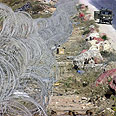
It may not revolve around sub-prime mortgages, but land, or the lack of it, lies at the heart of many of the Palestinians' problems, the Bank says.
Since the start of a Palestinian uprising in 2000, when jobs were already scarce in a broken landscape of refugee camps and overcrowding, the West Bank's economy has shrunk rapidly, with ever larger volumes of foreign aid unable to arrest the decline.
"The situation has become untenable," says the report, which catalogues economic damage inflicted by decades of restricted access to land, whether for farming, industry or housing.
An area comprising nearly 60 percent of the West Bank, called Area C in provisional peace accords with Israel, is under the full control of the Israeli military, and most of it is sparsely populated and underutilized.
Palestinian access to nearly 38 percent of the West Bank is limited, notably by Jewish settlements and Israeli security.
The allocation of land in the 1995 Oslo Accords, which laid the path for a peace accord that was to lead to an eventual Palestinian state, was meant to be transitory, the report says.
"However, little territory has been transferred to Palestinian Authority control since the signing ... and this process has been completely frozen since 2000," it added.
But the Palestinian population has not stopped growing, and its ability to meet its own development needs through economic activity is now severely constrained by the land pinch.
'Since 2000, economy in decline'
In the increasingly cramped and fragmented space beyond Area C, land use decisions have become irrational and environmental management unsound, says the World Bank.
"Today, only a fraction of the Palestinian population resides in Area C," it notes, because there is very little incentive to stay there.
"While this may have been acceptable under an interim scenario ... after 13 years with minimal Israeli redeployments from Area C, the situation has now become untenable," it says.
"This territorial division distorts land markets by creating land shortages," which in turn create housing shortages and put industrial development at a disadvantage.
"In the aftermath of the Oslo Accords, the Palestinian economy was expected to enter a period of sustained and rapid growth," the report said.
Instead, growth lasted only a few years, and since 2000 the economy has been in decline, with GDP down 14 percent from its peak in 1999. When the rapidly rising population is factored in, the figure is even worse: per capita GDP is down 40 percent.
International peacemakers have recently focused on trying to bolster the Palestinian economy alongside US-sponsored talks aimed at reaching a deal on establishing a state, but progress has been limited on both fronts.
The World Bank forecast that "the investment climate will remain unfavorable and business opportunities much below potential" as long as most of the West Bank remains inaccessible for Palestinian economic investments.















